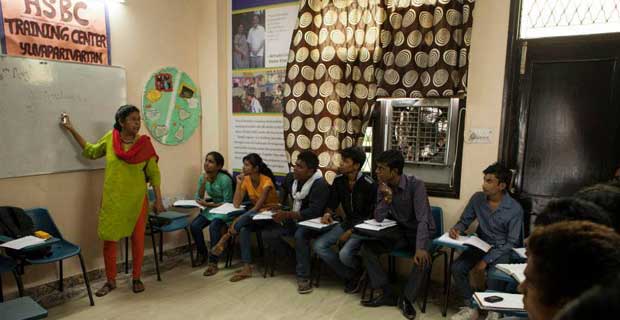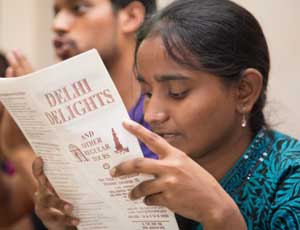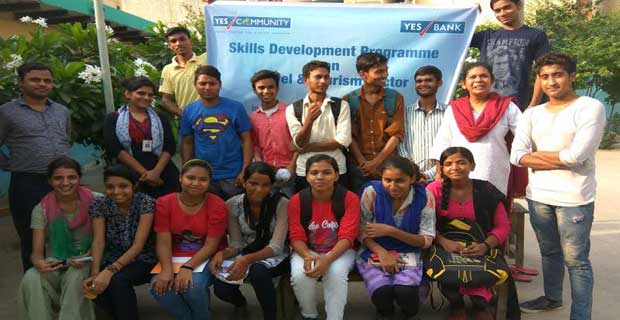Sponsored Listings:
Responsible Tourism approach to Education and Economic Empowerment
A Lajwanti Naidu
Tourism is recognised as one of the largest and rapidly growing industries in the global economy. With reference to India, tourism has contributed 6.2% to the national GDP in the year 2016. While tourism has made an important contribution to the economic growth in many countries, the industry had both social and economic impacts. There are several challenges which the industry identifies that they are not positive. Critics argue that the growth has generally not filtered down to the poorest. Therefore, tourism has caused poor displacement, increased Local costs, loss of access to the resources along with social, cultural disruptions. In this article, I would like to bring out the roadmap for skilling and building responsible India.
Many argue that tourism could promote pro–poor tourism growth. Therefore, more of tourism earnings should be retained within the host country. This in turn would ensure the more benefits will reach the poor groups which in turn will enhance considerable potential for tourism based poverty reduction. Tourism is one of the pioneer industries to reduce poverty and achieve the Millennium Development Goals (MDG). The MDGs are a set of human development targets agreed upon by world leaders at the United Nations Millennium Summit. They address arrange of issues including Poverty Hunger, Child Mortality, Primary Education, Water and Sanitation, Environmental Sustainability.

Education and Economic Empowerment
From the MDGs, the United Nations moved to sustainable development goals to end poverty, hunger and food security and education for all. Poverty is more than the lack of income and resources to ensure a sustainable livelihood. Its manifestations include hunger and malnutrition, limited access to education and other basic services, social discrimination and exclusion as well as the lack of participation in decision-making. Economic growth must be inclusive to provide sustainable jobs and promote equality. Source (un.org)
According to the UNWTO Global Code of Ethics Article 5, local populations should be associated with tourism activities and share equitably in the economic, social and cultural benefits they generate, and particularly in the creation of direct and indirect jobs resulting from them. It also states that tourism policies should be applied in such a way as to help to raise the standard of living of the populations of the regions visited and meet their needs; the planning and architectural approach to and operation of tourism resorts and accommodation should aim to integrate them, to the extent possible, in the local economic and social fabric; where skills are equal and priority should be given to the local manpower.
Tourism professionals, particularly investors, governed by the regulations laid down by the public authorities, should carry out studies of the impact of their development projects on the environment and natural surroundings; they should also deliver, with the greatest transparency and objectivity, information on their future programme and their foreseeable repercussions and foster dialogue on their contents with the populations concerned.
Here comes the significance of Human Resource as an integral part of development. Tourism industry has an eco system which is highly human centric. Therefore, it is imperative to train and impart various skills related to customer care to destination management is a responsible manner to the local community.

Vocational Training in Tourism
India has the second largest population in the world at 1.27 billion in 2015 and with a fast growing economy of 5.5% GDP increase. The National Skill Development Corporation (NSDC) has projected an incremental shortage of 244 million labourers by the year 2023 and 13 million on annual basis.
India has the advantage of a young population as a resource but more than 80% of these youth have not completed their schooling. Harnessing this ‘Demographic Dividend’ through appropriate skill development programmes, the government can provide an opportunity to achieve human productivity with in the country. With this motive, the present BJP government of India has set a target of skilling 500 million people by 2023.
Prospects and Practices of Inclusive Tourism
Tourism as a tool for poverty alleviation has been eulogised worldwide. Moreover poverty alleviation has been given utmost priority by United Nations World Tourism Organisation by implementing the ST-EP –Sustainable Tourism as an effective tool for eliminating poverty. Public Private Enterprises are turning to several alternative forms of tourism like Community Based Tourism (CBT), Pro Poor Tourism and Eco Tourism etc. But there is very less emphasis given to Skill Development and Vocational Education and Training in Tourism.
Open Eyes, a social enterprise as a part of inclusive tourism took initiative to take up the training and integrate the students to mainstream tourism.
A study has been conducted to show the impact of vocational training in tourism for period of 90 days for the subjects who hail from below poverty line and various slum areas of Jahangirpuri. The objective of this programme was to link vocational training in tourism to livelihood. Respondents have shown keen interest in training and indeed the study reflected that tourism can be used for poverty reduction and can be a pathway to prosperity.
The skill development training focused on two strategies i.e. capacity building and training to enhance non financial livelihood impacts and expand local employment to increase economic benefits.
Aligned with the objectives of NSDC in association with our mobilisation team, Anna Alaman Torres, CEO, Open Eyes identified an inclusive tourism programme to empower the students who are not accessible to university education with an objective to provide them job opportunities in tourism sector.
In August 2014, I along with Open Eyes developed our first pilot in vocational training in tourism to promote Inclusive Tourism in India. This course trained 12 youngsters with the concepts of travel and tourism, field exposure, English speaking and communication skills, motivation, cultural differences, personality development and entrepreneurial skills. After 90 hours of theoretical program, the students underwent three months paid internship in the tourism sector.
As an Academician with acumen for Skill Development with several training session to my credit with ‘Earn While You Learn’ organised by Ministry of Tourism and Commonwealth Games Volunteer Training, I have adopted this Inclusive Tourism programme from infancy.
However, certain challenges were encountered in vocational training in the current Indian scenario. Lack of spare time: to find out ways and means to help the poor and to develop skill jobs in tourism is a Herculean task. In fact people below poverty line find that time spent on training is not time spent on securing food. Therefore, individuals are reluctant to take part in vocational training without financial support.

Employees are seen as cost rather than long term investment
Employers have a myopic view. Workers are treated as costs, not as long term resources. Therefore, employers rarely increase the training skills of the employees. As rightly said that patience with self is confidence- my 90 days of vigorous training with the school dropouts at Jahangirpuri paved its way from poverty to prosperity. Out of the 12 students, nine of them were successfully placed with travel agencies and tour operators. This further led to our initiative with Yes Bank for funding the Skill Development programme. Presently, it has been conducted at Adarsh Nagar, Jahangirpuri, Jasola and Kathputli Colony at Shahdara.
To finally conclude following are certain contemplations which can be pondered upon to empower education to economic and employment endeavour.
Enhanced Economic Benefits
– Expand local employment, wages commitments to local citizens for jobs and vocational training
– Expand local enterprise opportunities including those who provide services to tourism operations food supplies etc
– Develop collective income sources– revenue shares, equity dividends and donations
Enhance Non-Financial Livelihood Impacts
– Capacity building training
– Mitigate environmental impacts
– Improve social and cultural impacts
– Increase local access to infrastructure and services provided for tourists– Roads, communication, accommodation etc
Enhance Participation and Partnerships
– Create more support policy/planning framework that enables the participation for the poor
– Increased participation of the poor in decision making by government and private sector
– Build pro poor partnerships with private sector
There is a compelling need to launch more skill development programmes in tourism where there is huge requirement of human resources in India. Apart from NSDC and several social enterprises similar to Open Eyes can bring a huge change by imparting various skills to build India into a Responsive Incredible India!!!
Source: travelnewsdigest.in










